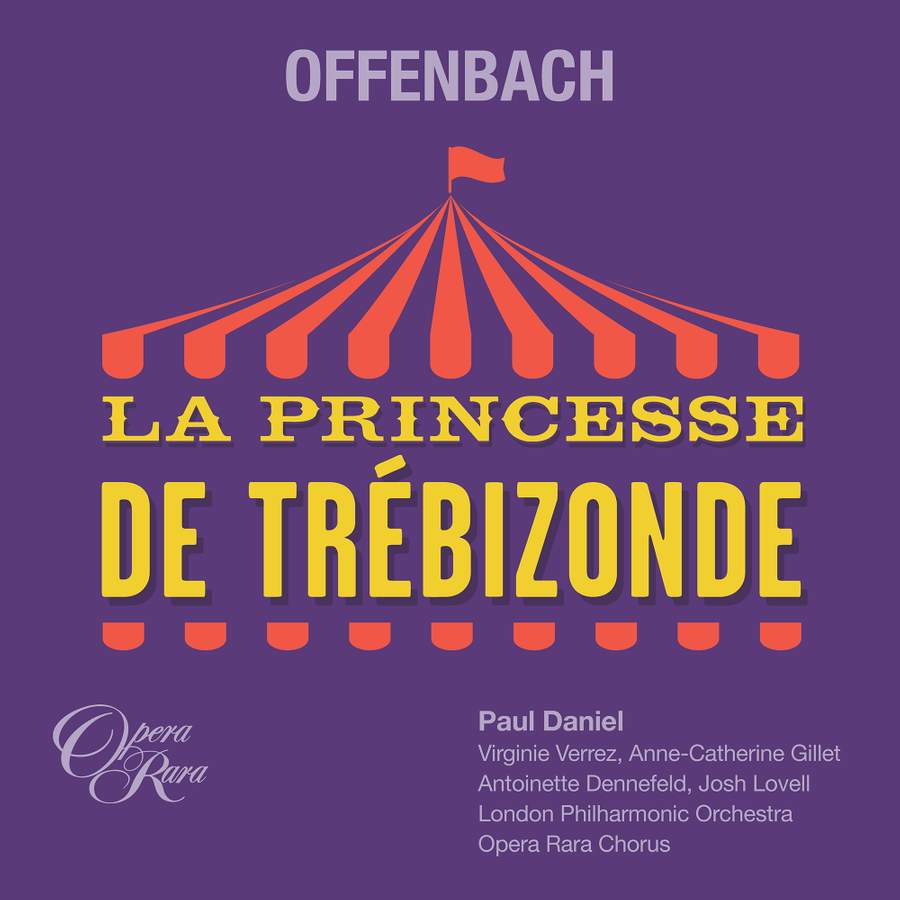OFFENBACH La princesse de Trébizonde (Daniel)
View record and artist detailsRecord and Artist Details
Genre:
Opera
Label: Opera Rara
Magazine Review Date: 11/2023
Media Format: CD or Download
Media Runtime: 120
Mastering:
DDD
Catalogue Number: ORC63

Tracks:
| Composition | Artist Credit |
|---|---|
| La princesse de Trébizonde |
Jacques Offenbach, Composer
Anne-Catherine Gillet, Zanetta, Soprano Antoinette Dennefeld, Régina, Mezzo soprano Christophe Gay, Cabriolo, Baritone Christophe Mortagne, Trémolini, Tenor Josh Lovell, Prince Casimir, Tenor Katia Ledoux, Paola, Mezzo soprano Loïc Felix, Sparadrap, Tenor London Philharmonic Orchestra Opera Rara Chorus Paul Daniel, Conductor Virginie Verrez, Prince Raphael, Mezzo soprano |
Author: Richard Bratby
A young man of more-than-usually sensitive disposition falls in love, not with a living, breathing girl but with a beautiful doll. Sounds familiar? This isn’t Offenbach’s Les contes d’Hoffmann but La princesse de Trébizonde, an opéra-bouffe (not, please note, an operetta) premiered in Baden-Baden in 1869 before being substantially revised for Paris in 1870. And this time, there’s a twist to the story. It turns out that the waxwork model of the fabled Princess of Trébizonde really is alive: she’s the funfair owner’s daughter Zanetta, standing in for the star exhibit after it’s been damaged in transit.
What ensues is Offenbach at only slightly less than peak form (and even that’s debatable: Le Figaro thought it the equal of Orphée aux enfers). On the one side, there’s the bohemian world of the funfair; on the other, royalty – the lovelorn Prince Raphaël and his overbearing, slap-happy father Prince Casimir (who refutes – if necessary with his hunting crop – all rumours that he wears make-up and dyes his hair). There’s endless scope for fresh and fizzy musical comedy here, and what’s not to enjoy about a score that includes a quintet for five plate-spinners and a Toothache Arietta complete with notated howls?
But the central story is one of young love, and if you enjoy the gentler Offenbach of Fantasio and L’île de Tulipatan you’ll recognise (and cherish) that particular mood. The trouser role of Prince Raphaël (like many of Offenbach’s trouser roles) has a poignancy and a tenderness that makes La princesse de Trébizonde touch the heart as well as tickle the ribs. It’s a delight, in other words, and who knows how popular it might have proved had its first run not been spoilt (like so many things in European history) by the outbreak of the Franco-Prussian War?
La princesse de Trébizonde is not wholly unknown on record but there’s never been a recording as complete, as polished and as beautifully presented as this new set from Opera Rara. There’s a full-colour booklet, complete with period images (posters, newspaper illustrations and sheet music covers) as well as the complete text (with translation) of Charles Nuitter and Étienne Tréfeu’s libretto. The performance itself uses Jean-Christophe Keck’s new edition of the three-act Paris version, including spoken dialogue, and there’s an excellent essay from this great Offenbach scholar. As a very generous bonus, there’s also an appendix containing the eight complete numbers that were cut between Baden and Paris, including a surprisingly impressive Melon Trio (yes, it really is all about eating melons: no subtext here. Well, maybe just a little one …).
Paul Daniel, the LPO and the Opera Rara Chorus go at it with terrific verve and – when required – delicacy. These aren’t period instruments but it’s fair to call the approach historically informed: right from the Overture there’s a lightness, a springiness and a poise that puts you in mind of French ballet music (listen to the barely-there tingle of the triangle and the easy, seductive lyricism of the woodwind solos). The orchestra slips easily between pastel delicacy and breezy panache, the chorus is up-front, crisp and bright and the whole thing has an immediacy that Daniel suggests is an attempt to recreate the acoustic of the Bouffes-Parisiens (it was actually recorded in Henry Wood Hall).
I can’t speak to that (and you might feel that the simulated stage effects over the start of the Overture are a miscalculation), but certainly everyone sounds as if they’re enjoying themselves, generating an atmosphere that even carries the (mostly Francophone) cast through the spoken dialogue: so often a stumbling block on disc. (It’s cued separately and coloured blue in the booklet, the better to separate it out should you so choose.) And what an engaging, idiomatic cast it is, too, with Josh Lovell sounding wry and deliciously hissable as the charming monster Casimir (he gets a particularly catchy waltz-song), Christophe Gay every bit the showman as the fair-owner Cabriolo and Antoinette Dennefeld sounding rich and ripe as the all-too-worldly tightrope artiste Régina.
Savour, too, the Gallic tang of Christophe Mortagne’s tenor as the valet turned fairground barker Trémolini. They all inhabit their characters; and they all sing warmly and phrase with lightly worn style. At the centre of it all, Anne-Catherine Gillet (Zanetta) and Virginie Verrez (Raphaël) are as likeable a pair of lovebirds as you could ask for, Gillet sparkling brightly (but never too sweetly) over her livelier numbers while Verrez brings a lovely, plangent wistfulness to Raphaël’s gentler, more bittersweet arias. The aim, as so often with Offenbach, is to find just enough emotional truth to make you care for these characters, before returning to the laughter refreshed. In company like this, no lover of 19th-century opera could be blamed for succumbing to the charms of this – very much alive – Princesse de Trébizonde.
Discover the world's largest classical music catalogue with Presto Music.

Gramophone Digital Club
- Digital Edition
- Digital Archive
- Reviews Database
- Full website access
From £8.75 / month
Subscribe
Gramophone Full Club
- Print Edition
- Digital Edition
- Digital Archive
- Reviews Database
- Full website access
From £11.00 / month
Subscribe
If you are a library, university or other organisation that would be interested in an institutional subscription to Gramophone please click here for further information.




